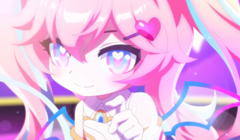A recent case involving gaming animator Darim illustrates the extreme backlash against women accused of feminism in South Korea, leading to online abuse, job losses, and even physical violence. This growing trend reflects a deeper societal issue of gender discrimination and misogyny, compelling many women to hide their feminist identities.
Facing Witch Hunts: The Backlash Against Feminism in South Korea's Gaming Industry

Facing Witch Hunts: The Backlash Against Feminism in South Korea's Gaming Industry
The disturbing trend of harassment and violence against women expressing feminist views in South Korea's gaming sector is highlighted through personal accounts and societal analysis.
As the sun began to set one evening, Darim, an animator at a prominent South Korean studio, uploaded a trailer for her latest video game character, brimming with pride and anticipation. However, she soon found herself inundated with a barrage of threats and insults from a segment of the gaming community—specifically young male gamers who perceived a gesture in the animation as a feminist statement. This incident has become emblematic of a wider problem plaguing South Korea, where public expressions of feminism often result in vicious harassment.
The infamous "finger-pinching gesture," misconceived as a derogatory feminist signal, triggered outrage among certain gamers who quickly labeled Darim a "feminist." Within hours, the harassment escalated into death threats, and the game's developer, Nexon, pulled the promotional video, capitulating to the uproar. Darim, who felt blindsided by the backlash, expressed the emotional toll it took on her, leading her studio into turmoil as they scrambled to control the fallout.
In recent years, there's been a worrying rise in online witch hunts targeting women within the gaming industry and beyond, often distinctively led by young gamers alleging any sign of feminism. This behavior has prompted them to engage in relentless campaigns against female industry workers, seeking to end their careers at any cost. "They believe that feminists are lurking within companies, waiting to sabotage the male workforce," explains Minsung Kim, an activist and former gamer who has emerged to support victims of these attacks.
Fearful of negative repercussions, many women in South Korea are forced to conceal their feminist beliefs, significantly impacting the social landscape and perpetuating gender inequality. "If you want to admit you're a feminist in South Korea, you have to be really brave," states lawyer Yu-kyung Beom, reflecting on the grim climate surrounding feminist discourse.
This environment has further manifested in real-life violence, with incidents like that of a woman named Jigu, who was attacked simply for having a short haircut, wrongly interpreted as a sign of feminist ideology. Her case reflects a deeper societal identification where any deviation from traditional femininity may risk an aggressive backlash.
As this trend continues, the distrust among women towards openly identifying with feminist ideals grows, as evidenced by a recent IPSOS poll indicating that only 24% of South Korean women would label themselves as feminist, down from 33% just a few years prior.
Confronted by the pervasive backlash, Minsung and others in the feminist community are endeavoring to create safe spaces and legal protections, advocating for change that challenges the distorted views being perpetuated by extremist factions. "These are not representatives of the majority, just a loud minority," he contends, emphasizing the need for societal solidarity and action.
The stakes remain high as not only the future of gender equity in South Korea hangs in the balance, but also the safety and freedom of women expressing their rights and identity in an increasingly hostile environment.






















